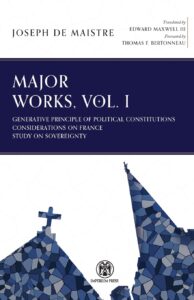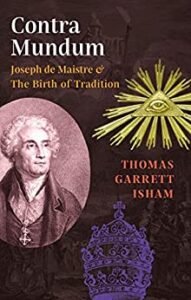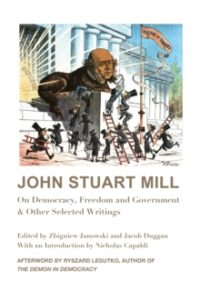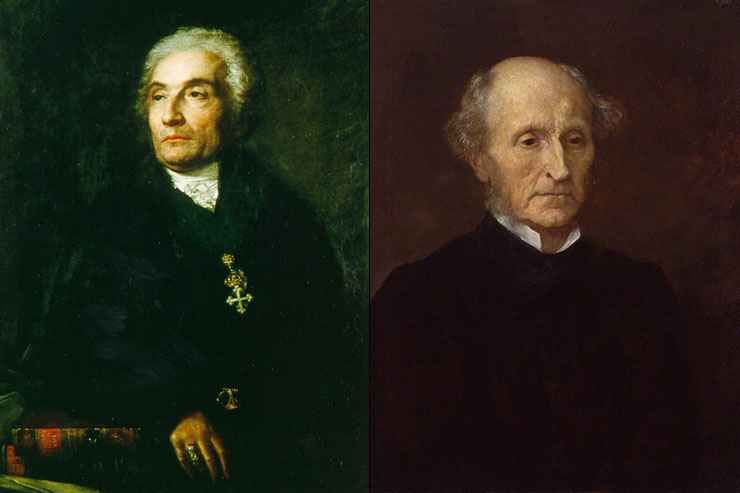Joseph de Maistre: Major Works, Vol. I
Translated by Edward Maxwell III
Imperium Press
348 pp., $22.00
Contra Mundum: Joseph de Maistre & the Birth of Tradition
by Thomas Garrett Isham
Angelico Press
156 pp., $25.00
John Stuart Mill: On Democracy, Freedom and Government & Other Selected Writings
Edited by Zbigniew Janowski and Jacob Duggan
St. Augustine’s Press
820 pp., $45.00
It is hard to imagine two thinkers more different than Joseph de Maistre and John Stuart Mill, both in their political views and in their understanding of human nature. Although both lived during the same century (Maistre died in 1821 and Mill in 1873) and each wrote in reaction to the advent of popular government, one would never confuse either their opinions or their writing styles.
It is also hard to find any famous or near-famous thinker who has expressed admiration for both of these figures at the same time, with the possible exception of the 19th-century Danish Jewish literary scholar, Georg Brandes. An omnivorous reader and commentator on European literature, Brandes wrote on Maistre and Mill with almost equal admiration. But there was a difference in how he reacted to their ideas. Brandes generally agreed with Mill, a political progressive and religious free thinker; but Brandes viewed Maistre, a Savoyard aristocrat and counterrevolutionary, as a brilliant French littérateur with an arresting polemical style, yet someone whose political position he found alien.
A less generous reader, the English intellectual historian Isaiah Berlin, lavished praise on the democrat Mill but famously judged Maistre to be a forefather of 20th-century fascism. In his approach to the past, Berlin may have resembled the Hungarian Marxist Georg Lukacs, who divided up 19th-century thinkers into progressives (like himself) and those who foreshadowed the Nazi derailment. This not-so-subtle approach got me to thinking many decades ago, as a graduate student, about whether 19th-century thinkers were responsible for what a later generation did with their ideas. Was it really necessary in studying the luminaries of that magnificent century to give out merits and demerits in terms of what happened in the 20th century? That, by the way, remains an open question.
It is still very much in doubt that Marx “caused” the crimes of Lenin and Stalin any more than racial theorists like Arthur de Gobineau and Houston Stewart Chamberlain contributed to the Holocaust. Political actors initiate political change, but intellectuals writing on politics have a much more remote and reflective—rather than causative—relation to that transformative process.
Allow me to admit, as an admirer of so-called dark enlightenment thinkers well before that term came into use, that I have always respected Maistre as an original, insightful thinker. His critical observations about social contract theory, his stress on the necessity of social hierarchy, and his witty comments about the abstraction “mankind” (now replaced by the even more imaginary “humankind”) left their marks on me at the age of 20 the first time I read this literary master.
Engrossingly touching a wide range of historical, anthropological, and moral topics, Maistre showed himself to be a brilliant wordsmith.
Although Maistre ended up defending the impractical scheme of a papal monarchy for Europe as a final court of resort, his dissecting, argumentative style reveals a certain kinship with figures of the French Enlightenment, whom he set out to discredit. His sarcastic wit recalls the prose of Voltaire, who, despite his anticlericalism, was, like Maistre, a vigorous defender of monarchy and critic of the doctrine of equality. Both Maistre and Voltaire were French aristocrats who were educated by Jesuits. But unlike Voltaire, who lived before the Revolution, Maistre spent a large part of his life in exile as a consequence of that cataclysm.
During Napoleon’s rule, Maistre became the impecunious ambassador for the exiled duke of Savoy at the Russian imperial court in St. Petersburg. There he lived in straitened circumstances, although the Russian Czar, who became fond of his foreign guest, tried to improve his circumstances. In Russian exile, Maistre penned his later widely read St. Petersburg Dialogues, which were the recollected and greatly embellished late-night conversations held among three francophone dignitaries in what was once Russia’s capital. Engrossingly touching a wide range of historical, anthropological, and moral topics, Maistre showed himself to be a brilliant wordsmith. His aphoristic prose contrasts strikingly with the plodding style of Mill, who often seems trapped in dense syntax. (Even more painful to read than his English prose are Mill’s labored French letters to his friend Alexis de Tocqueville, author of the famous study on early American democracy.)

The recent Maistre release by Imperium Press includes three of his major works—On the Generative Principle of Political Constitutions, Considerations on France, and Study on Sovereignty—with an introduction written by the late Thomas Bertonneau.
An illuminating treatment of Maistre’s work and influence can be found in Thomas Garrett Isham’s 2017 monograph Contra Mundum: Joseph Maistre & the Birth of Tradition. The focus of Isham’s examination is the pivotal importance of Maistre in creating a concept of “tradition” on the European continent in the wake of the French Revolution.

Isham does not treat Maistre as an unreasoning counterrevolutionary nor, like Berlin (whose interpretation he engages), as a precursor of interwar fascism. Rather, he regards his subject as the creative inventor of an anti-revolutionary strain of thought that heavily influenced, among others, later religious thinkers. Isham establishes conceptual links between Maistre’s attacks on the Enlightenment and his calls for religious unity to later bearers of his thought, like the Dutch Calvinist theologian Abraham Kuyper and the French metaphysician (and eventual convert to Islam) René Guénon.
According to Isham, Maistre’s devotion to the Catholic Church did not prevent him from supporting a reunification of confessions, which in his mind should have included the then-still-recognizably Christian Church of England, which embraced both Catholics and Calvinists. Although Maistre regarded Protestantism as a divisive force, he did not object to it theologically as much as he did to its role as a breakaway movement. If Protestants could be integrated into a unified Christian antirevolutionary front, reasoned Maistre, then the divisiveness and sectarianism might be brought under control. The Calvinist Kuyper, for instance, created the Antirevolutionary Party in Amsterdam. Within this confessionally conciliatory but adamantly anti-leftist organization, which went on fighting the effects of the French Revolution, both Catholic and Calvinist clergy formed a unitary front.
Maistre’s influence also shaped René Guénon’s identification of religious tradition with esotericism and the presence of social and religious hierarchy. Although the Catholic hierarchy in interwar France understandably rejected Guénon’s defense of tradition as an organizational and spiritual form with a changing historical content, the idea did have an impact in Latin countries, especially among critics of modernity. Isham is correct that some of this religious esotericism can already be located in Maistre’s oeuvre and was a common feature of European romantic thought. (This aspect of Maistre’s work also receives discussion in my book Conservative Millenarians: The Romantic Experience in Bavaria.)

Curiously, the commentators on Mill in the volume produced by St. Augustine’s Press are more nuanced in their discussion of their subject than is Bertonneau in his celebratory introduction to Maistre: Major Works. Zbigniew Janowski has difficulty imagining that, in a world conformed to Mill’s utilitarian plan, eccentricity or genius would be able to flourish. The threat of democratic mediocrity, which Tocqueville warned against, would be very real in Mill’s universe. In his afterword, Ryszard Legutko wonders about the soundness of Mill’s characterization of the great moral teachers of humanity as “gainsayers”; that is, those whose main concern was questioning how things are, rather than providing spiritual vision. “Neither Jesus nor Socrates could have been possible if their only mental horizon was Mill’s utilitarianism,” Legutko writes.
Perhaps we shouldn’t turn up our noses too quickly. Mill may be more relevant than Maistre for understanding our age. His sentiments and values are now commonplace. He gave voice to a growing democratic spirit, as Janowski and Legutko remind us, which he sought to promote.
What distinguished Mill from our progressives and faux conservatives is that he could still appreciate those with whom he disagreed politically. He wrote insightfully about the conservative Romantic poet Samuel Taylor Coleridge and maintained a longtime friendship with that celebrator of the hero in history, Thomas Carlyle. Although Mill wrote critically about “unrestrained” or “despotic” aristocracy, he did not attack that social class categorically. He points out that at least in England, “no aristocracy is, was, or ever will be totally unchecked.”
What distinguished Mill from our progressives and faux conservatives is that he could still appreciate those with whom he disagreed politically.
Mill’s 1850 short essay “The Negro Question” is remarkable. Although it includes passionate denunciations of slavery (which had been recently abolished in the British Empire), it also praises the achievements of the newly emancipated black “laboring class.” In a situation in which freemen can offer their labor on the market, Mill noted, “I have not yet heard that any of them has been reduced to beg [for] his bread.” Whether this quip entirely describes the real situation at the time may be beside the point. But one thing can be inferred from Mill’s statements regarding freed slaves being gainfully employed: he would never have favored the compensatory justice and degradation of the white race that are now identified with “civil rights.”
I have usually balked at characterizing Mill as a liberal in the 19th-century sense because he stood to the left of the more typical members of that persuasion. He strongly favored universal suffrage for both sexes (except for the illiterate and welfare recipients), and he openly advocated for an extensive welfare state. He was also a militant religious skeptic and believed in a future when religious superstition would be replaced by “science.” These were not characteristic liberal views for the time. Even in his correspondence with Tocqueville, who was hardly a political reactionary, Mill seemed unhappy with the emphasis that Tocqueville placed on the need for religion as the basis of social morality.
That said, Mill, like his father James, argued passionately against full-blown socialism and believed in the role of an enlightened bourgeoisie in introducing what he hoped would be an age of scientific inquiry. Although Mill was not the quintessential liberal that Janowski’s book makes him out to be, and although he was well to the left of that political genius, he was certainly a transitional figure. Socially and culturally, Mill answered to a recognizable 19th-century liberal type, even if politically, as I argue in my book After Liberalism, he was a precursor of welfare-state democracy and an early advocate of the modern administrative state.



Leave a Reply